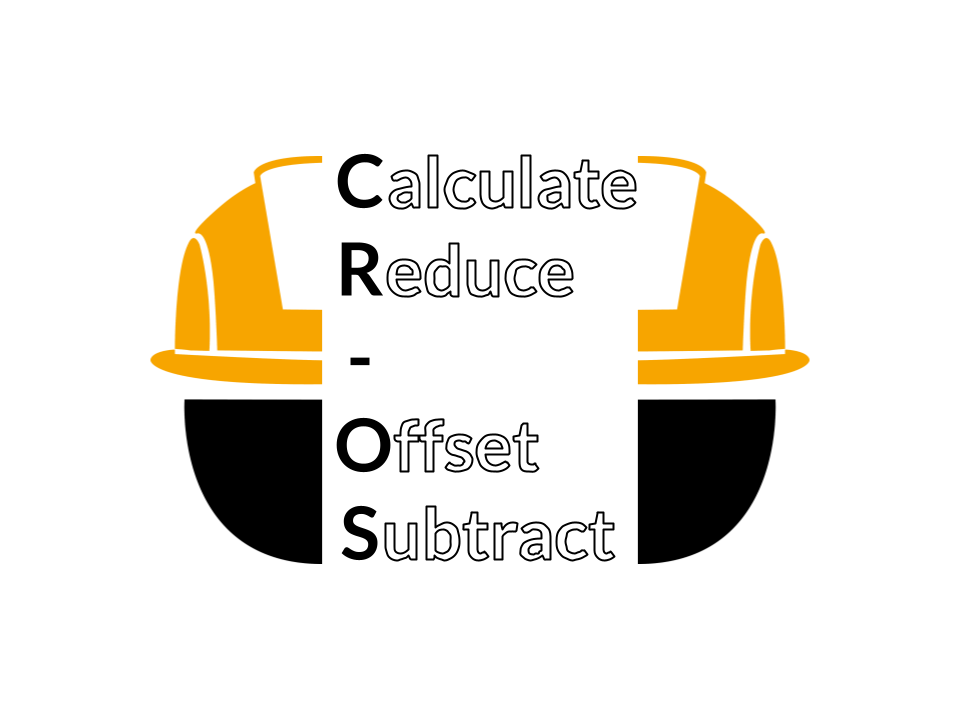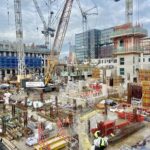Honestly, we’re all addicted to carbon in the construction industry. The 4 billion tonnes of cement production per year accounts for 8% of carbon alone. About 45 % of UK emissions come from the built environment with 10% directly associated with construction. Only Coal, Oil and Gas are bigger culprits. To meet the UK’s commitment to be ‘carbon net zero’ by 2050 we need to go on an immediate carbon diet.

Net zero or carbon neutral is when you achieve a balance between the amount of greenhouse gas emissions produced and the amount removed from the atmosphere. This means that whilst there will still be some emissions, they will be offset through natural carbon sinks, such as trees and soils.
With such a daunting undertaking it becomes all too easy to kick the can down the road and neglect our individual and collective duty to reduce our carbon footprint. According to David Attenborough “We’re refusing to take steps that we know have to be taken”. Delay akin to denial.
To stay on track, over the next nine years we in the construction industry need to halve both the energy use of the UK’s buildings and our carbon emissions.
So many of the solutions for net zero already exist, some that include major investment, which may be beyond your short-run budget. This should not exclude us from taking immediate action, making affordable changes to decarbonize. You can drive efficiency and reduce your carbon footprint without breaking the bank.
Lost in the jungle of carbon jargon, we encourage a common carbon language, that’s understandable onsite and at the office. This creates an enhanced environment for accountability and responsibility so that we can all begin to address build-related carbon emissions together. Breaking down complex terminology, Then we can action immediate change and implement longer-term solutions.
This is where innDex can offer our expertise, inspired by the passion of Greta Thunberg. We have asked our team to get busy being CR-OS. Our formula will inform our push for carbon efficiencies. That sets a consensus-built definition for net-zero embodied carbon and makes us all accountable in the carbon challenge.

CR-OS WITH OPERATIONAL CARBON
Calculate, Reduce-Offset and Subtract.
We must first calculate our Carbon footprint, setting a baseline for future performance improvements. To us at innDex data collection is fundamental to leadership: what you cannot measure you cannot manage, and what you cannot manage you cannot change. Calculating our carbon emissions is the first step to managing our carbon diet. Working out where we can make reductions before deciding on which strategy to Offset and Subtract our carbon calories works best for us.
Your carbon footprint is the total amount of carbon dioxide released into the atmosphere as a result of the activities of a particular organization, service or product. Largely consisting of Embodied Carbon and Operational Carbon:
Embodied Carbon is the amount of carbon emitted during the extraction of raw materials, manufacture, refinement and transport of materials. Including the building phase and the deconstruction and disposal of materials at the end of life. Although improvements must be made with Embodied carbon cost, they are to an extent inevitable and can be balanced out over the service life of the building.
Operational Carbon is the amount of carbon emitted during the operational or in-use phase of a building. This includes the construction, use and maintenance. Recognising that Operational carbon currently accounts for 28% of global GHG, Tackling this offers immediate returns on investment.
innDex is taking steps to help our clients measure the carbon emitted during the construction process. One example is accurately calculating the transport carbon footprint of your workforce and materials to and from the site, verified with vehicle data from both the DVLA and Department for Transport. From that, we work with you to determine where we can Reduce, Offset and even Subtract our Operational Carbon emissions.
Using automated analysis of commute, travel data, onsite material, fuel tracking and energy usage. Users can see how a construction project is operating, with the data calculated and categorised into an easily accessible web-based platform, using common metrics that are easily understandable and actionable. Our digital tool can be used immediately to curate different aspects of a project’s carbon footprint. Allowing you to drive efficiency and reduce your active carbon footprint, make improvements and change embedded behaviour.
innDex’s smart optimisation services combine data expertise with secure, non-invasive technology that can monitor occupancy and key performance data across multiple building projects, helping you to understand your energy performance, connecting directly to the management, and optimize a response. Making a few adjustments with informed solutions can significantly decrease your carbon emissions.
Our internal reaction was to make the leap to an all-electric fleet. In our instance, electric vehicles are better for the planet and are cheaper to operate and maintain. There have been clear economic benefits for us as a company, furthering our ambition to cut our operational carbon and drive down our operational costs.
Furthermore; despite erratic annual variations, the carbon footprint of the built environment has been trending downward in the UK since 1990. With significant inroads made with the increase in insulation installation rates between 2008 and 2012 which have cut the operating carbon cost of our existing building stock dramatically.
Despite the myriad of challenges we face, the potential for industry and infrastructure to dramatically reduce carbon emissions is already proven. We have improved processes to calculate, track and report embodied carbon. Maximizing the use of existing assets, promoting responsibility and seeking new circular business are improvements rather than innovations that are immediately actionable.
At innDex we remain steadfast in our commitment to this climate challenge and we look forward to finding new solutions with you; we want you to demand more and set more ambitious targets, and we promise to keep you updated with our next moves in the Carbon e-Mission. Let’s open up the conversation, be accountable, mentor each other and make changes to conquer our carbon addiction. Our industry must play its part in leading the world toward decarbonization and a more sustainable planet for future generations.
SHARE THIS ARTICLE
RECENT POSTS
-
 Construction NEEDS to Invest in TechnologyMarch 29, 2020/0 Comments
Construction NEEDS to Invest in TechnologyMarch 29, 2020/0 Comments -
 Our Carbon e-MissionMarch 15, 2021/
Our Carbon e-MissionMarch 15, 2021/ -
 Let’s Eliminate Fatigue in ConstructionMay 29, 2020/
Let’s Eliminate Fatigue in ConstructionMay 29, 2020/





